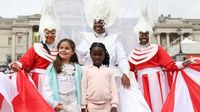St George's Day, typically celebrated on April 23 each year, has been rescheduled for 2025 due to church rules that prevent the feast day from coinciding with Easter. This year, the day will be observed on Monday, April 28, shifting the traditional celebrations that thousands of people look forward to annually.
The Church of England has made this change in accordance with its regulations, which state that any saint's day falling within the week before or after Easter must be moved to the Monday after the second Sunday of Easter. This year, Easter Sunday fell on April 20, prompting the rescheduling.
As the date approaches, communities across England are gearing up for festivities. Councils, local groups, and charity organizations are preparing events to honor Saint George, the patron saint of England. The last time this date shift occurred was in 2019, when St George's Day was also celebrated on the following Monday.
On April 22, 2025, a reception was held at Downing Street to commemorate St George's Day, where Prime Minister Sir Keir Starmer emphasized the importance of the day and the values it represents. He remarked that England is engaged in a "never-ending fight for our flag and what it represents." This statement reflects ongoing discussions about national identity and inclusivity in modern England.
Starmer's comments come against a backdrop of a broader debate about what it means to be English, especially in light of recent discussions surrounding race and identity. Earlier this year, a controversial debate was ignited by Russian-born podcaster Konstantin Kisin, who questioned the English identity of Prime Minister Rishi Sunak, who is of Indian descent. Kisin's remarks were supported by former Home Secretary Suella Braverman, who stated that she has never identified as English.
However, public sentiment appears to be shifting. Recent research indicates that three-quarters of Britons believe that England's ethnic minorities can be just as English as their white counterparts. This marks a significant change in attitudes over the past decade, suggesting a growing acceptance of a more inclusive definition of Englishness.
Despite this progress, the conversations surrounding English identity remain complex. Starmer's call for unity on St George's Day is particularly poignant in light of recent events that have seen divisions within communities. He highlighted the spirit of togetherness that emerged in the aftermath of last year's riots, where people came together to clean up their neighborhoods and support one another.
St George's Day has a rich history, dating back to the 9th century, when it was first celebrated in England. Traditionally, the day is marked by various festivities, including parades, Morris dancing, and community gatherings. This year’s celebrations will take place amidst a backdrop of discussions about the future of English identity and how to celebrate it inclusively.
In London, events are planned to commemorate the day. A garden party at St George's Garden in Waterloo is set to feature complimentary refreshments and a gardening workshop. Additionally, Leadenhall Market will host performances and music to celebrate the occasion.
While St George might be recognized as England’s national hero, it’s important to note that he was not actually English. Born in modern-day Turkey, his legend grew over the centuries, becoming a symbol of virtue and bravery. The tale of St George slaying a dragon is rooted in medieval literature, evolving from earlier narratives that depicted battles between good and evil.
As the country prepares for the festivities on April 28, the question remains: how will England celebrate its patron saint in a way that is inclusive of all its citizens? The challenge lies in embracing the diverse identities that make up modern England while honoring the traditions that have shaped the nation.
In light of the recent discussions about identity, St George's Day serves as a reminder of the need for a more inclusive narrative that celebrates all who identify as English, regardless of their background. The day could become an opportunity to reflect on the complexities of national identity and the shared values that unite the people of England.
As communities come together to celebrate, the hope is that St George’s Day can foster a sense of belonging and pride among all English citizens, reinforcing the idea that Englishness is not confined to a singular narrative but is instead a tapestry woven from diverse threads.
Whether through community events, family gatherings, or personal reflections, the rescheduled St George's Day offers a chance for all to engage with and celebrate what it means to be English in today’s society. As the flags are flown and the festivities commence, it is a moment to recognize the shared heritage and future of England.






